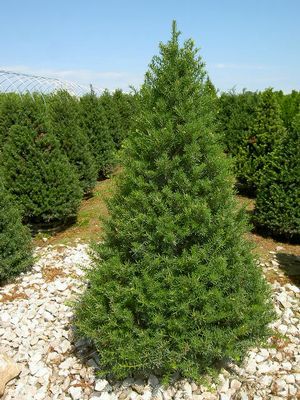Taxus cuspidata 'Capitata' is a named coined by the U.S. nursery trade to classify a class of seedling-grown Japanese yews described as growing narrowly upright with fastigiate branching and a single trunk. Since no specific clone is responsible for the origin of these plants, 'Capitata' should not be recognized as a legitimate cultivar name. Given the variability of seedlings, no specific structure, color or growth rate can be guaranteed.
Equally curious is that American growers applied the same nomenclatural blunder to seedling-grown, spreading generic seedlings, calling them, Taxus cuspidata 'Expansa.'
This situation was first described in 1936 by E. Lowell Kammerer in Bulletin of the Morton Arboretum, 11:44. 'Capitata' translates into "capitating" or "head-forming" in the Latin language. It's unclear how this term applies to narrow upright plants.
